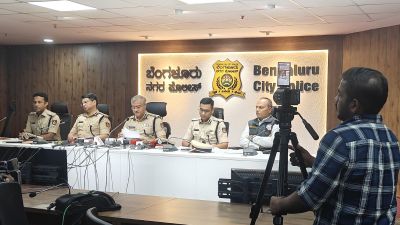Hey! What’s so funny?
There are enough situational comedies on television to make you die laughing. But you're more likely to die of anything but that. Seriously...

There are enough situational comedies on television to make you die laughing. But you’re more likely to die of anything but that. Seriously. Of the sitcoms currently on air, only Hum Paanch,Tu Tu Main Main and Dekh Bhai Dekh receive a good TRP rating. Dekh Bhai Dekh is a rerun as was Zabaan Sambhal Ke to begin with. The fact that they are enjoying success in prime time slots, is in itself a joke on the plethora of new comedies: STAR Plus’ line-up has been particularly unfunny: there was Jeene Bhi Do Yaaron and Banjara Guest House; now there’s Daal Mein Kaala and Maal Hai To Tal Hai — all leave you frankly unamused and often appalled at what passes for humour on telly. Don’t Indians have a funny bone or is it that we need a hammer to tickle it?
Let it be said immediately: we do have a sense of humour: remember Yeh Jo Hai Zindagi? Wasn’t that funny and didn’t we laugh? Aired almost a decade ago, it is still considered the best sitcoms to date. "Now every comedy, in its own way is a take-off on YJHZ. Even Dekh Bhai Dekh, which is worth watching, is an off-shoot of YJHZ”, thinks comic hero, Satish Shah, star of Mast Mast Hai Zindagi, “Filmi Chakkar (in which he also starred) seems to have inspired a few new serials, too.” One of the problems is that comedy is treated as a low-budget affair, feels Shah. And actors prepared to work for less money are preferred to quality actors. A-grade performers like Farooq Shaikh and Shah end up with the likes of Chamatkaar and Filmi Chakkar. "Sitcom is the safest bet (for channels).
Run it for three weeks and if it doesn’t fetch a good TRP, either hack it or shelve the project to an unwatchable slot," complains Shaikh. Shekhar Suman, who rose to name and fame through Dekh Bhai Dekh has another point of view: "You need to be a genius to make a comedy — it’s an inherent talent," he feels. Kamlesh Pandey, producer and writer of the comedy Mrs Madhuri Dikshit, agrees that while soaps are easier to make, comedy needs much more effort. A former head of Zee programming, Pandey found that though there was great demand for them, good comedies were hard to find.
Why? Lack of good writers and good, comic talent. Most serials begin on a promising note, but peter out by the end of the fourth episode. If the script is poor, even good actors can’t rescue the serial, feels Suman. Shaikh agrees: "With a weak script, you end up flogging a tired horse,” he says, “Abroad they have six writers for each sitcom, whereas, here, you have one writer writing for a dozen serials".
Renuka Shahane, now essaying her first comic role in Mrs.Madhuri Dikshit thinks comedies lack proper characterisation. Tu Tu Main Main and Hum Paanch work well because each character has a well-defined behavioural pattern.
The success of a serial depends, also, on a sense of timing and coordination between actors. "The new breed of actors don’t know a damn about comedy. A joke is lost for split-second timing,” complains Suman, “Here you are not just responsible for yourself but for the whole team. It is like a pack of cards — if one card falls, the whole edifice collapses.” He feels Dekh Bhai Dekh‘s worked as it had the right actors at the right place at the right time.
In the absence of a funny script and empathy between actors, loud comedy rules the airwaves. Something Indian TV has inherited from Indian cinema. Says Nivedita Saraf, producer of Chutki Bajake," Either its buffoonery or overacting. The problem with us Asians is that unless something is boldly expressed, it doesn’t carry weight with the audience." Subtlety is a thing of the past. "Weak script results in overacting, which seems to be the trend now,” feels actress Tanaaz Currim, star of Zabaan Sambhal Ke.
There’s something else which irritates many actors as well as many viewers: guffaws of canned laughter. "What we need is a chuckle here, a giggle there,” explains Suman, “But we end up using the same laughter everywhere. There is this particular female laugh which makes me feel like beating the woman up.”
Despite these shortcomings, serials like Chamatkar have their faithful following. "It’s like living in a noisy neighbourhood. Initially, it’s bad but ultimately you cannot do without it,” says Shaikh. What keeps him going is the fact that he can take potshots at any undesirable element of society or a particular attitude and get away with it.
“If we are looking at this genre seriously, then individual efforts will not help, it has to be a group and institutional effort,” thinks Pandey, “Otherwise, viewers will turn away from comedy. As it is, they are getting hooked to horror," he warns.



- 01
- 02
- 03
- 04
- 05




























